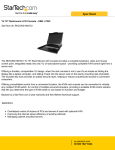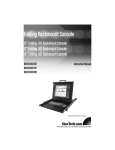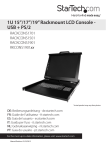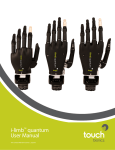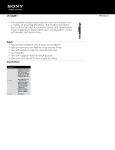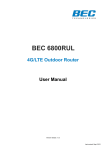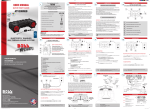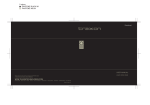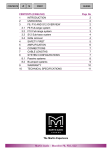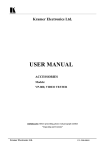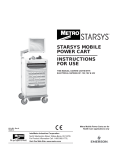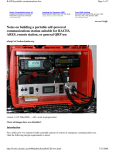Download Folding Rackmount Console
Transcript
RKCONS1501GB / EU RKCONS1701GB / EU RKCONS1901GB / EU Instruction Manual Folding Rackmount Console 15”/17”/19” Folding LCD Rackmount Console FCC Compliance Statement This equipment has been tested and found to comply with the limits for a Class B digital device, pursuant to part 15 of the FCC Rules. These limits are designed to provide reasonable protection against harmful interference in a residential installation. This equipment generates, uses and can radiate radio frequency energy and, if not installed and used in accordance with the instructions, may cause harmful interference to radio communications. However, there is no guarantee that interference will not occur in a particular installation. If this equipment does cause harmful interference to radio or television reception, which can be determined by turning the equipment off and on, the user is encouraged to try to correct the interference by one or more of the following measures: • Reorient or relocate the receiving antenna. • Increase the separation between the equipment and receiver. • Connect the equipment into an outlet on a circuit different from that to which the receiver is connected. • Consult the dealer or an experienced radio/TV technician for help. Use of Trademarks, Registered Trademarks, and other Protected Names and Symbols This manual may make reference to trademarks, registered trademarks, and other protected names and/or symbols of third-party companies not related in any way to StarTech.com. Where they occur these references are for illustrative purposes only and do not represent an endorsement of a product or service by StarTech.com, or an endorsement of the product(s) to which this manual applies by the third-party company in question. Regardless of any direct acknowledgement elsewhere in the body of this document, StarTech.com hereby acknowledges that all trademarks, registered trademarks, service marks, and other protected names and/or symbols contained in this manual and related documents are the property of their respective holders. Table of Contents Introduction...................................................................... 1 Packaging Contents..................................................................... 1 Installation........................................................................ 1 Hardware Installation.................................................................... 1 Turning on the console................................................................. 4 Configuring display settings.......................................................... 4 Connecting the console................................................................ 4 Testing the console....................................................................... 5 Panel controls and OSD functions................................................ 6 Specifications................................................................... 10 Technical Support............................................................ 11 Warranty Information....................................................... 11 Screen Quality & Pixel Policy....................................................... 11 i Introduction Packaging Contents • 1 x 1U LCD Rack Console Drawer • 1 x Console Cable Kit • 1 x Mounting Rails - Set • 1 x Power Cable Installation Hardware Installation Hardware Kit Contents Screw kit Keys (2) Side Rails with front and rear brackets (2) (Used to attach Rail Mount to Console body) Mounting the console 1.Loosen the rear screws (pre-installed in side rails) and adjust the length of the rear bracket to fit the depth of your cabinet: 1 2.Install the rail into the cabinet: 3.Tighten the screws that were loosened in Step 1: 4.Install the remaining rail, repeating Steps 1-3. 5.Gently, but firmly insert the console into the left and right rails: 2 6.Unlock the console, and pull the left and right rail-lock switches towards you simultaneously, and hold them in this position while pushing the console into the cabinet: 7.Install three screws on each side of the console: 8.Installation is now complete: 3 Connecting the console To connect an LCD console to a computer, perform the following steps: USB 1.Turn off your computer. 2.Insert the video (VGA) connector of the KVM cable into the video card connector on the rear panel of your computer. 3.Identify and connect the PS/2 mouse and PS/2 keyboard connector to the correct PS/2 ports on the rear panel of your computer. 4.Connect the AC power cord to the power inlet on the console. Connect the remaining end of the AC power cord to an available power outlet. Turning on the console Make sure all cables and the power cord are connected properly. Using two hands, grasp the rear of the drawer, lift the tab and pull the panel up and forward. This will disengage the momentary on/off switch and the unit should power on. The LED located to the left of the monitor panel should turn from orange to green, verifying that the unit is operational. Configuring display settings After connecting the drawer and turning on your computer, you may need to configure one or more of the following display settings to allow the computer to display at the console’s native resolution. See Specifications on page 9 for the correct resolution mode for your model. • Display mode (also called desktop area or video resolution) • Refresh rate (also called vertical scan rate or vertical sync) 4 • Color depth (also called color palette or number of colors) Each video card has several controls that allow you to adjust the display settings, however, the software and driver for each video card is unique. In most cases, you can adjust these settings using a program or utility provided by the manufacturer of the video card. Most video cards use the Windows Display Properties control panel to configure the display. To open the Windows Display Properties, click the right mouse button in a blank area of the Windows desktop and then select Properties. The Settings tab usually lets you change the Color Palette and the Desktop Area (X by Y pixel resolution). Some video cards integrate additional features into the Windows Display Properties control panel giving you an extra setup options that are flexible and easy to use. For example, the control panel may include an Advanced Properties button, an Adjustment tab, or a Refresh tab for changing other settings. Other video cards have a separate utility for setting display properties. Whenever you change the resolution, color, or refresh rate, the image size, position, or shape may change. This behavior is normal. You can readjust the image using the monitor on-screen controls. For more information on the monitor on-screen controls, refer to Panel controls and OSD functions. For more information on configuring the display settings, please refer to the manual that accompanied your video card. Testing the console To test that the console is working properly, perform the following steps: 1.Power up the monitor/keyboard drawer, and then turn on your computer. 2.Make sure the video image is centered within the screen area. Use the OSD controls to adjust the image (see Panel controls and OSD functions) or press the Auto button on the right hand side of the monitor. Note: If the unit does not power up when the panel is pulled up, try pushing the soft power on/off button on the left side of the monitor panel to power up the unit. 5 Note:You can adjust the horizontal and vertical position, contrast, and brightness to better suit your video card and your personal preference. Before you begin, make sure that power to all of the devices you will be connecting to the console have been turned off. To prevent damage to your installation due to ground potential difference, make sure that all of the devices being installed are properly grounded. Once all peripherals have been connected, please power them on. Panel controls and OSD functions The following controls are located on the left side of the console monitor: Controls Descriptions Soft power on/off. Adjacent LED is lit when on. Auto Auto-synchronize and scale down display to any valid factory preset timings. Up Press to scroll to the function you want to adjust. Down Press to scroll to the function you want to adjust. Menu To access the main menu. This button also acts as the Enter button. Auto tune Press the “Auto tune” button. The panel will adjust the display size automatically and also tune the panel to its optimized state. Input Source 1.Press the Menu button. 2.Use the Down and Up buttons to scroll. 3.Press the Menu button to enter, and you will see: VGA/DVI. 4.Use the Down and Up buttons to select the input signal source. 5.Press the Menu button to save your selection. 6 Brightness 1.Press the Menu button. 2.Use the Down and Up buttons to scroll to Brightness. 3.Press the Menu button to enter. 4.Use the Down and Up buttons to adjust the brightness of the display. 5.Press the Menu button to save your selection. Contrast 1.Press the Menu button. 2.Use the Down and Up buttons to scroll to Contrast. 3.Press the Menu button to enter. 4.Use the Down and Up buttons to adjust the contrast of the display. 5.Press the Menu button to save your selection. Color 1.Press the Menu button. 2.Use the Down and Up button to scroll. 3.Highlight Color, and press the Menu button to enter, which will launch the following screen: Icon Description 9300°K To set CIE coordinates at 9300°K color 7500°K To set CIE coordinates at 7500°K color 6500°K To set CIE coordinates at 6500°K color User Auto color Return To set user defined CIE To auto adjust color To exit and return to the previous page 4.Use the Down and Up buttons to adjust the contrast of the display. 5.Press the Menu button to save your selection. 7 Position 1.Press the Menu button. 2.Use the Down and Up buttons to scroll. 3.Highlight Position and press the Menu button to enter, which will launch the following screen: Icon Description Image Pos To adjust the position of the image OSD Pos To adjust the position of the OSD Return To exit and return to the previous page 4.Use the Down and Up buttons to scroll. 5.Press the Menu button to save your selection. Language 1.Press the Menu button. 2.Use the Down and Up buttons to scroll. 3.Highlight Language, and press the Menu button to select, which will launch the following screen: 4.Use the Down and Up buttons to scroll, and highlight the preferred language. English German French Italian Spanish 5.Press the Menu button to save your selection. 8 Recall 1.Press the Menu button. 2.Use the Down and Up buttons to scroll to Recall. Press the Menu button to enter, where you will be able to select Yes/No using the Down and Up buttons. Once you have done so, press the Menu button. Note: selecting Yes will return your settings to the factory default state. Select No if you do not wish to make this change. Exit To exit the menu, scroll to Exit and press the Menu button. Power Indicator Light Color Status Green ON RED Standby RED Suspend RED OFF 9 Specifications RKCONS1501GB/ RKCONS1501EU RKCONS1701GB/ RKCONS1701EU RKCONS1901GB/ RKCONS1901EU Display Size 15” 17” 19” Panel Type Active Matrix TFT LCD Active Matrix TFT LCD Active Matrix TFT LCD Resolution Capabilities 1024 x 768 (max.) 1280 x 1024 (max.) 1280 x 1024 (max.) Back Light Dual lamps Four lamps Four lamps Supported Colors 16M Colors (6-bit with FRC) 16.2M Colors (6-bit with FRC) 16.2M Colors (6-bit with FRC) Response Time Rising Time: 5ms Decay Time: 11ms Rising Time: 2ms Decay Time: 14ms Rising Time: 2ms Decay Time: 10ms System Cables VGA + 2x PS/2 + 1x USB cable VGA + 2x PS/2 + 1x USB cable VGA + 2x PS/2 + 1x USB cable Keyboard / Mouse 106 key PS/2 keyboard 106 key PS/2 keyboard 106 key PS/2 keyboard with touchpad with touchpad with touchpad Sync 45~80KHz 45~80KHz 45~80KHz Power Source 100-240 VAC input 100-240 VAC input 100-240 VAC input Operating Temperature 0 ~50°C (32°F ~ 122°F) 0 ~50°C (32°F ~ 122°F) 0 ~50°C (32°F ~ 122°F) Storage Temperature -20° ~ 60°C (-4°F ~ 140°F) -20° ~ 60°C (-4°F ~ 140°F) -20° ~ 60°C (-4°F ~ 140°F) Humidity 10% ~ 90% RH 10% ~ 90% RH 10% ~ 90% RH Dimension 447.5 x 482 x 44mm (17.6 x 19 x 1.7”) 447.5 x 482 x 44mm (17.6 x 19 x 1.7”) 447.5 x 482 x 44mm (17.6 x 19 x 1.7”) Net Weight 11.8kg (26lbs) 13Kg (28.66lbs) 15Kg (33.06lbs) Chassis Construction Heavy duty steel Heavy duty steel Heavy duty steel Regulatory Certification CE/FCC CE/FCC CE/FCC 10 Technical Support StarTech.com’s lifetime technical support is an integral part of our commit-ment to provide industry-leading solutions. If you ever need help with your product, visit www.startech.com/ support and access our comprehensive selection of online tools, documentation, and downloads. Warranty Information This product is backed by a one year warranty. In addition, StarTech.com warrants its products against defects in materials and workmanship for the periods noted, following the initial date of purchase. During this period, the products may be returned for repair, or replacement with equivalent products at our discretion. The warranty covers parts and labor costs only. StarTech.com does not warrant its products from defects or damages arising from misuse, abuse, alteration, or normal wear and tear. Limitation of Liability In no event shall the liability of StarTech.com Ltd. and StarTech.com USA LLP (or their officers, directors, employees or agents) for any damages (whether direct or indirect, special, punitive, incidental, consequential, or otherwise), loss of profits, loss of business, or any pecuniary loss, arising out of or related to the use of the product exceed the actual price paid for the product. Some states do not allow the exclusion or limitation of incidental or consequential damages. If such laws apply, the limitations or exclusions contained in this statement may not apply to you. Screen Quality & Pixel Policy During the manufacturing process, certain cosmetic imperfections can occur which do not constitute defects in the screen requiring an RMA replacement. Defective or “dead” pixels or sub-pixels are common to all manufacturers of LCD displays. Visual imperfections are caused by one or more defective pixels or sub-pixels. A pixel is comprised of one red, one green, and one blue sub-pixel. If a defective whole pixel is always on, it will appear as a bright spot, typically white, yellow or other bright color, while if it is always off, it will appear as a dark brown of black spot visible on a bright background. A defective sub-pixel is less visible than a defective whole pixel as it is smaller, and dependent on the color of the defective sub-pixel as contrasted to the background color. A display is not deemed defective if it contains less than and up to: • 3 bright dots (pixel always on) • 5 dark dots (pixel always off) • 5 total bright and dark dots (on and off pixels) If your display appears to have defective pixels or sub-pixels, or if you should have any questions relating to this policy, please contact StarTech.com technical support either by phone, online live chat, or email. 11 StarTech.com has been making “hard-to-find easy” since 1985, providing high quality solutions to a diverse IT and A/V customer base that spans many channels, including government, education and industrial facilities to name just a few. We offer an unmatched selection of computer parts, cables, A/V products, KVM and Server Management solutions, serving a worldwide market through our locations in the United States, Canada, the United Kingdom and Taiwan. Visit www.startech.com today for complete information about all our products and to access exclusive interactive tools such as the Cable Finder, Parts Finder and the KVM Reference Guide.
















